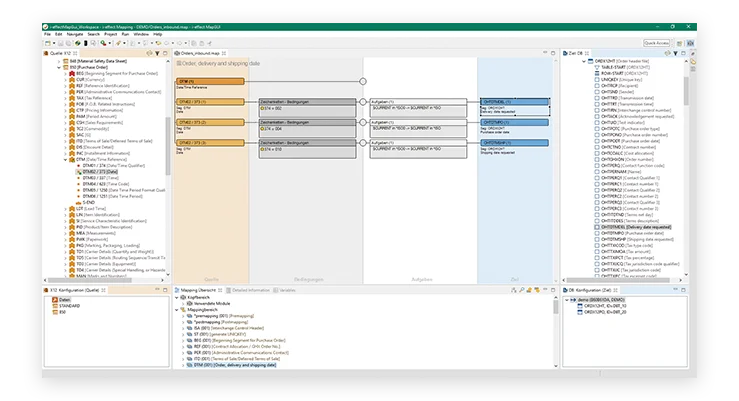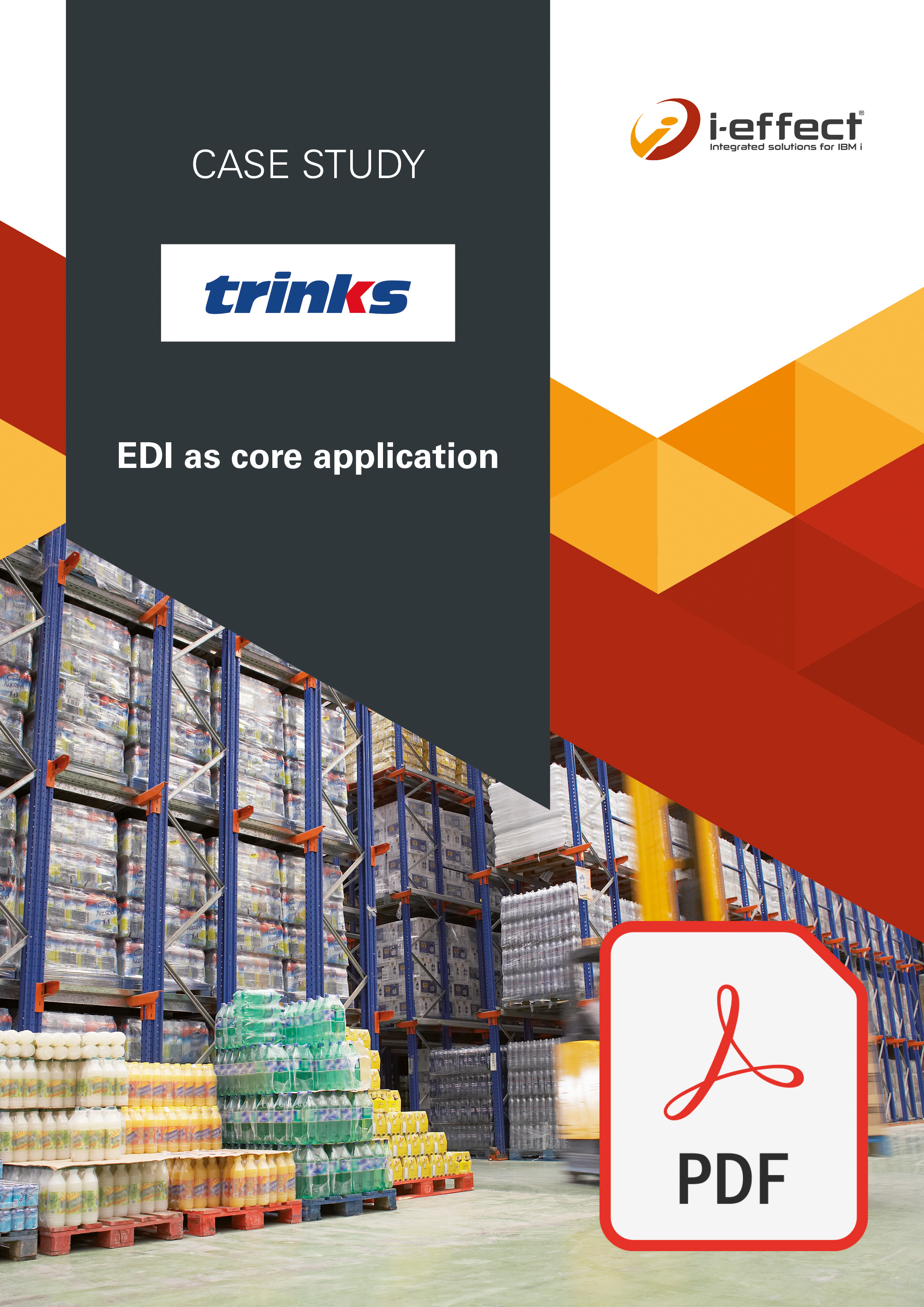TRINKS: EDI as a core application
The beverage wholesaler TRINKS can no longer imagine communicating with its approximately 1,800 EDI partners without EDI software. The company, which is headquartered in Goslar, has relied on the technology of menten GmbH for more than twenty years, both for pure EDIFACT formats and for e-mail and occasional fax traffic.
Meike Clausing, an employee in the IT department of TRINKS, where she is responsible for EDI, among other things, has been working for the company since 1998. Since about that time, the company has also been involved in electronic data exchange - from the very beginning with i‑effect®, the solution for electronic data exchange and data integration on IBM Power System from menten. The software processes incoming and outgoing EDIFACT messages and also sends PDF files as faxes or e-mails. The customers receive delivery notifications (DESADV) to announce upcoming deliveries. Invoices are generated in the ERP system, the spool files are converted to PDF format with i‑effect® and transmitted by e-mail.
TRINKS also no longer organizes the ordering process to its suppliers in paper form. The beverage producers receive ORDERS (purchase orders), send back ORDRSP (purchase order responses) and, when they have sent their invoices, receive a payment notification (REMADV).
The IT team has now integrated almost 1,800 EDI partners into i‑effect®. Vendors to whom the company sends order faxes are also maintained there, as are those with whom e-mail correspondence is conducted via i‑effect®. In the meantime, however, hardly any faxes are used, but almost everything that is not EDI is done via e-mail. TRINKS operates classic EDI traffic, i.e. the exchange of EDIFACT formats, with around 180 partners. In a typical week, about 5,700 orders, 5,900 shipping notifications, and 21,200 invoices are converted and sent with i‑effect®. On the incoming EDI side, there are 18,000 purchase orders, 13,300 shipping notifications, and 5,200 invoices.
No more transmission or comprehension errors
"The advantage of exchanging data via EDI is that we meet our partners' requirements for prompt delivery notifications, order confirmations, etc., and the error rate due to communication or comprehension errors is lower," says Meike Clausing. The same applies to incoming customer orders: i‑effect® transfers them directly into the ERP system, so no one has to type order data from order papers anymore. Even when orders are received by phone, transmission or comprehension errors occur again and again. Not so with EDI traffic. Even if an article number is transmitted incorrectly, this is quickly clarified in the course of the plausibility check.
TRINKS uses AS2 as the communication channel. There are hardly any transmission costs involved; all that is needed is an Internet connection. The incoming formats are converted to the in-house interfaces with i‑effect® and thus read into the iSeries/DB2 systems. In addition to AS2 as the main communication channel, TRINKS also receives EDIFACT data via SFTP or as e-mail attachments and processes them with i‑effect®. In the ERP area, TRINKS started at the time with the AS/400 software "Dogas/400" from Copa Systeme GmbH. In recent years, the IT team has developed many additional components around this software, for example in the area of invoicing. This construct is currently being replaced by an industry solution for the beverage industry from SAP.
"In the first step, we keep the previous in-house files, which will be converted to the SAP IDOC format in the future" explains Meike Clausing. This mapping takes place in i‑effect®. The FI/CO accounting module from SAP is already productive. Meanwhile, the converter is operated from both systems and fills in-house files, generates data in IDOC and EDIFACT format, and also serves internally as a data hub between the systems. New mappings were created in the menten solution for this purpose.
Eight different mappings for individual customer groups
When a company - like TRINKS - communicates with many companies via EDI, the challenge is always that each partner has different idiosyncrasies when it comes to designing their EDI formats. Only very few adhere to the real EDIFACT standard. Customer- or partner-specific deviations are the rule - these must be stored in the mapping. "We definitely can't get there with a standard mapping because there are so many deviations. For orders alone, we have eight different mappings for individual customer groups," says Meike Clausing.
TRINKS-IT takes over the creation of the mappings in i‑effect® to a large extent itself. Meike Clausing: "The mapping GUI was designed in such a way that - once you have dealt with it - we can essentially build the mappings ourselves." Sometimes, however, there is simply not enough time or the mapping is technically more demanding - in which case, of course, the menten support team can help.

Not once failed in 20 years
The EDI system is installed on the company's own servers. Detlef Waschke, IT manager at TRINKS GmbH: "i-effect is a core application for us. If it were to fail, that would be bad. But this has not been the case once in the last 20 years." The IT department is extremely satisfied with the support from menten GmbH; they respond quickly and the answers are competent. Every now and then, for example, partners change parameters in the formatting of their EDI files; the support team can then assist here if necessary. Customer orders via app, as menten has already implemented for other customers, are an interesting option for TRINKS in terms of further expansion of the system.
The company
TRINKS GmbH, headquartered in Goslar, is one of Germany's leading service providers in the field of beverage logistics. As a beverage wholesaler (GFGH), TRINKS supplies the food trade and beverage pick-up markets in a wholesale distribution function. The company procures the products from its suppliers and takes over the full-load delivery as well as the empties disposal on the customer side. TRINKS has 17 nationally distributed locations with an area of approx. 700,000 m², 10,000 unloading points including pick-up customers and approx. 17,000 full-load items as well as 4,000 service items. With 1,600 employees, the company generated net sales of 1.6 billion euros in 2018.
Challenges
With the large number of messages to be processed within a very short time window, a wide variety of message types with individual adaptations must be converted to the EDI standard and transferred to the ERP system. The prerequisite here is a standardization of the data before the transfer into the ERP system, so that no manual activities are required after the data transfer. Communication and transmission errors are thus eliminated even before the data is transferred.
Solutions
TRINKS has been using the EDI solution from menten since around 1998. Special requirements can be met via partner-specific mappings, as logic can be integrated upstream or downstream. Today, around 1,800 EDI partners are connected. Both EDI communication and the conversion between incoming formats and the internal DB2 are handled by i‑effect®.
Benefits
The main advantages of using EDI are the high process speed and error-free communication within the entire process chain from the order to the electronic dispatch of the invoice. By saving paper, TRINKS also makes an important contribution to environmental protection.

